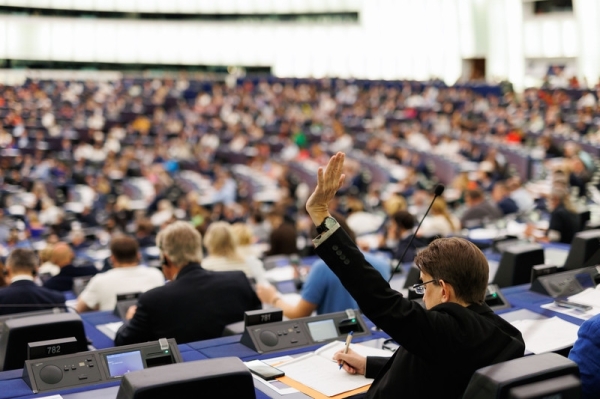MEPs favourite topic — their seats, and how they get elected
Few things interest politicians more than the way they are elected. But finding a system that most can agree on continues to elude MEPs.
One of the innovations in the Lisbon Treaty was that MEP seats are divided between the EU-27 according to the principle of so-called "degressive proportionality".
At the moment, that means that the number of seats ranges from the six held by Luxembourg and Malta to Germany’s 96.
But, in practice, seats are haggled over every time a new member state joins or, in the case of the UK, leaves.
The problem, as a parliament research paper published this week set out, is that this means that votes cast in smaller states have a greater impact on the overall distribution of seats among European parties in the parliament. Under the current system, it is also possible for the political party with the most votes not to get the most seats.
Thus, this "transnational electoral inequality" is likely to get worse as more countries join the EU.
"This poses a challenge to the democratic legitimacy and public acceptance of the European Parliament (EP) that needs to be addressed when developing a permanent system for the allocation of EP seats," the paper states.
At a hearing of the European Parliament’s constitutional affairs committee on Wednesday (14 February), the assembly’s institutional pointy-heads gathered to discuss proposals by professors Friedrich Pukelsheim and Victoriano Ramírez González and Dr Manuel Muller to resolve these dilemmas with a mathematical formula.
Pukelsheim told MEPs that a mathematical model called Bazi comes closest to reaching the fairest distribution of seats. That said, he noted that the current system is only seven seats different from the proposed formula.
However, gathering a group of academics and politicians produced more questions than answers.
Committee chair Salvatore De Meo, an Italian conservative, asked what could be done to avoid the "absurd" situation where high contributors to the EU budget would have fewer seats than those who pay less.
Meanwhile, Portuguese centre-right lawmaker Paulo Rangel linked the reform to the reform of the council voting rules — another Pandora’s box.
"This is not a political problem but constitutional. It is impossible to solve the representation in parliament without at the same time solving the question of representation in council," he said.
"If people say that they are federalists in a federation then there must be equality," he added.
Voters perplexed
Others worried that the new formula might be too complicated to explain to voters.
If reform of parliament seats (there are currently 705 MEPs, from 27 member states) is coupled with changes to voting in the council then it will probably need a new treaty — but there are few signs that EU governments want to re-open the laws on how the parliament’s composition, let alone the council.
Last summer, after formally rejecting a parliament proposal to introduce a pan-EU transnational list to elect 25 MEPs, member states called on the parliament "to come up with a fair, durable and transparent method to allocate seats, and to take account of demographic developments".
MEPs had hoped that a transnational list would help ‘Europeanise’ the European Parliament elections this June and reverse the trend of poor voter turnout.
The European Parliament will have a "soft deadline" to submit a proposal with the new allocation mechanism by the end of 2027.
That looked suspiciously like kicking the can down the road.
But if Ukraine and others join the EU, the system in both parliament and council would have to be reopened.
"It’s important that we entrench a system in law before the accession of Ukraine or before the UK comes back," said Andrew Duff, a former liberal MEP and one of the EU’s preeminent institutional experts.
"We are searching for a fair system that brings stability and strengthens the legitimacy of the parliament," said Duff, adding that the result must be "something durable that will not be constantly opened up."
Anna Collado Jiménez, a Spanish centre-right MEP who has been tasked with drafting the blueprint, said that it was important to have "mathematical backing" for it.
Horse-trading, not maths
Dividing up the seats in the parliament has always been as much about politics as mathematical formulae. Back in 2008, Italy threatened to reject the Lisbon Treaty if, as was initially proposed, it was allocated fewer seats than France because of its slightly smaller population. Italy argued that its large expat community should be taken into account and the resulting compromise turned a 750-seat chamber into 751.
For the moment, it’s academic. The rules governing the parliament’s composition won’t be reformed without a treaty, and any momentum for constitutional reform driven by Macron’s Conference of the Future of Europe, an attempt to introduce the EU to participatory democracy, was extinguished by Russia’s invasion of Ukraine.
But the debate, and professors with their formulas, will return.

